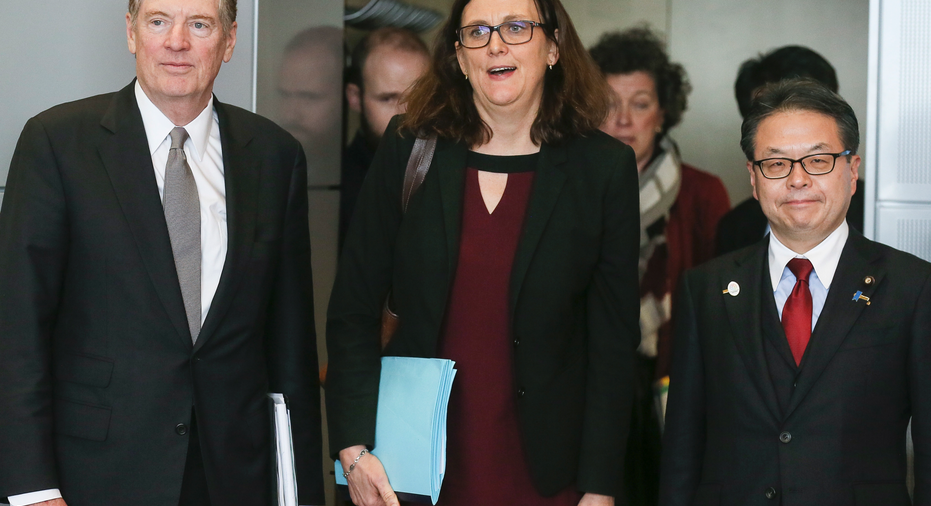The Latest: No steel tariff exemption for EU granted yet

BRUSSELS – The Latest on international reaction to U.S. President Donald Trump's push for steel tariffs (all times local):
5:45 p.m.
The EU's trade chief says talks with U.S. President Donald Trump's envoy failed to secure an exemption for EU steel from upcoming tariffs that have sparked fears of a new trade war.
EU Trade Commissioner Cecilia Malmstroem said she had a "frank" discussion with U.S. Trade Representative Robert Lighthizer in Brussels on Saturday about the steel tariffs, insisting that "the European Union must be excluded" because it is a close U.S. ally.
She said she got "no immediate clarity on the exact U.S. procedure for exemption" and that new talks are planned for next week.
The two also met in Brussels with Japanese Minister of Economy, Trade and Industry Hiroshige Seko. All three pledged in a statement afterward to work together to fight dumping that hurts jobs and industries around the world.
Trump argues the tariffs are designed to protect U.S. jobs and national security. He said Canada and Mexico are exempt for now, and other countries could be spared if they can convince the administration that their steel and aluminum exports don't threaten American industry.
___
3:05 p.m.
Key U.S. trading partners and businesses have warned the tariffs could backfire, provoking a trade war a trade war and hurting allies like the EU and Japan more than China, their main target.
Japan's government has warned that new U.S. steel tariffs could hurt its economic relations with the United States.
Japanese Economy, Trade and Industry Minister Hiroshige Seko also cautioned before talks with President Donald Trump's trade envoy Saturday that "falling to exchanges of unilateral measures will not be in the interest of any country," according to the Kyodo news agency.
Seko was apparently referring to the EU threats of retaliation.
Trump argues the tariffs are designed to protect U.S. jobs and national security. He said Canada and Mexico are exempt for now, and other countries could be spared if they can convince the administration that their steel and aluminum exports don't threaten American industry.
The EU insists that it is committed to open, global trade. EU Trade Commissioner Cecilia Malmstroem rejected Trump's assertion that the tariffs are needed to protect U.S. national security, especially when most EU countries are members of NATO.
___
1:20 p.m.
U.S. President Donald Trump's trade envoy is meeting Saturday with top officials from the European Union and Japan, who are pushing back against new U.S. steel tariffs that have unleashed fears of a broader trade war.
The EU is seeking clarity from Washington about whether the 28-nation bloc will be exempt from the U.S. tariffs, which come into force in two weeks. If not, the EU has threatened retaliatory tariffs on U.S. products like peanut butter and orange juice.
EU Trade Commissioner Cecilia Malmstroem met Saturday in Brussels with Japanese Economy, Trade and Industry Minister Hiroshige Seko, before U.S. trade representative Robert Lighthizer arrived to join them for three-way talks as well as individual discussions with the EU and Japanese trade chiefs.
The meeting had been previously planned but took on greater importance because of Trump's announcement of a 25-percent tariff on steel imports and 10 percent on aluminum imports.
___
10:05 a.m.
The trade chiefs of the European Union and Japan are holding talks about U.S. President Donald Trump's plans to impose tariffs on steel and aluminum amid fears they could trigger a broader trade war.
EU Trade Commissioner Cecilia Malmstroem is meeting Saturday in Brussels with Japanese Economy, Trade and Industry Minister Hiroshige Seko.
U.S. trade representative Robert Lighthizer is expected to join the two for broader talks later Saturday.
The EU is seeking clarity from Washington about whether the 28-nation bloc will be exempt from the U.S. tariffs, like Canada and Mexico are. If not, the EU has threatened retaliatory tariffs on U.S. products.
Key U.S. trading partners and businesses have warned the tariffs could backfire, provoking a trade war and hurting allies more than China, their main target.



















